Each day brings worrying news of soldiers, policemen, civilians dying in the Kashmir valley.
Is the situation in Kashmir spiraling out of control?
What can the Indian Army, the police and paramilitary forces, the state and central governments do to halt the slide towards anarchy?
One of the Indian Army's most experienced generals, formerly the highest ranking officer in the Kashmir valley, surveys the landscape of conflict and reveals what needs to be done.
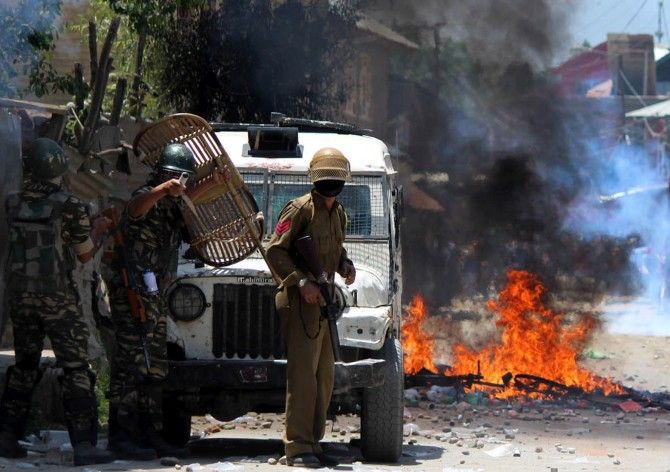
The soldiers were simultaneously battling stone pelters trying to distract the army and let the terrorists escape.
Photograph: Umar Ganie for Rediff.com
'That cannot be done till they roam around free, get money from Pakistan and seek attention.'
'The cycle of violence was very cleverly generated.'
'During night patrolling when it was discovered that dumper trucks were unloading heaps of stones in various places, it was the first indicator that there would be trouble.'
'Wherever stones were dumped, the stones were taken by the police to construction sites.'
'It was a laborious task, but we did it rigorously.'
'We had to use some smart tactics and soft skills to defeat the cycle of violence.'
Lieutenant General Kaiwalya Trivikram Parnaik's leadership as Northern Army commander saw a marked lowering of violence and three summers of relative peace in Kashmir.
The Northern Army Commander heads the Indian Army's most strategic command in the sensitive state of Jammu and Kashmir -- including the Siachen Glacier -- and the border with China.
The buck stops with the Northern Army Commander when it comes to defending the Line of Control and the security of Jammu and Kashmir.
General Parnaik served as General Officer Commanding in Chief of the prestigious Northern Command from January 2011 to July 2013. His leadership and vision in J&K earned him the Param Vishist Seva Medal in 2012.
But his experience is J&K runs further with multiple tenures in Rajouri, Kupwara and Tangdhar during a 41-year career in the Indian Army. His insights are crucial into understanding what is happening in Kashmir today.
Currently, the Joint Managing Director, Defence and Security at Rolta India, the retired general unravels Kashmir as only he knows it with Rediff.com's Archana Masih.
From stone pelters to anti-India separtaists to seditious pamphlets to infiltration, General Parnaik speaks about what it was like when his boots were on the ground in Kashmir.
Exclusive to Rediff.com
What is the best way of dealing with what is happening almost on a daily basis in the Kashmir valley?
Controlling a situation anywhere, whether in J&K, Assam or anywhere else, cannot be exclusively exercised militarily or through social work or appeasement or governance.
It has to be a combination of most of these to create an environment of trust and order which will bring people to observe rules and regulations and raise the grievances that they may have.
If all the organs of the State are unable to do this -- I am not saying they are failing -- then you look at the armed forces as the last resort.
Actually in J&K we have been the permanent resort.
The army tries to conjure up a scenario by which they can control the environment.
In my experience, I inherited the command in late 2010-2011 when similar stone pelting was happening.
There were trigger-based agitations. Triggers were created and agitations happened.
Agitations led to confrontations, confrontations led to stone pelting, stone pelting led sometimes to collateral damage.
The cycle of violence was very cleverly generated by some people. We couldn't adopt heavier methods or ask the police to arrest them all. We had to use some smart tactics and soft skills to defeat it.
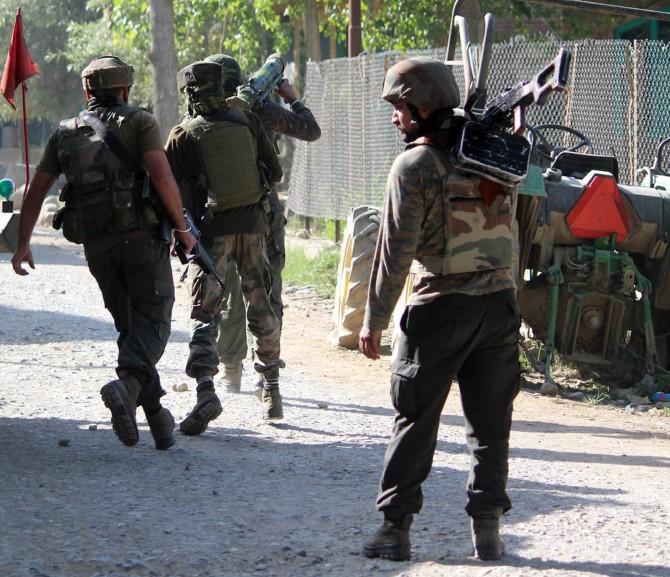
What were some of these soft skills and tactics?
We asked the police and army interspersed with intelligence agencies to carry out an area domination of the sensitive areas.
We started mapping these spots.
We knew the big mosques where leaders made provocative speeches; the sensitive areas around Srinagar; whether they were blocking highways or denying essential services or causing arson and loot.
We started dominating these sensitive areas.
We implemented simple but effective measures.
During night patrolling when it was discovered that dumper trucks were unloading heaps of stones in various places, it was the first indicator that there would be trouble.
So we shifted the pattern of surveillance and monitoring in the nights.
At the same time social network was monitored.
27 to 29 hostile sites on J&K were monitored.
It wasn't our job, but perception management was undertaken while our military operations continued.
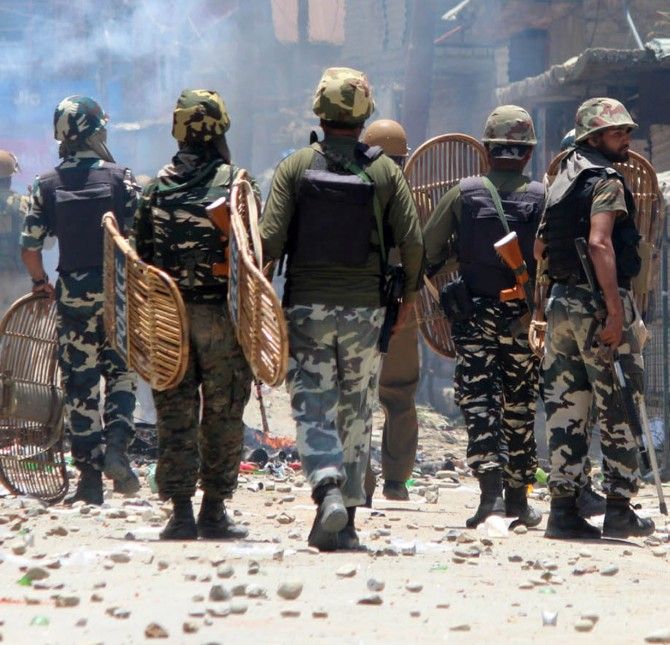
Which meant simultaneously guarding the Line of Control and controlling the stone pelters inside the valley?
The strategy was to strengthen the Line of Control to minimise infiltration.
While we held that flood gate, we identified the foreign terrorists and took specific operations to clean them.
The army was checking infiltration; going after foreign terrorist leaders because they get the money, instigate and control the local terrorists.
At the same time, local terrorists were cleverly prevented from collecting and throwing stones.
Wherever stones were dumped, those people were impounded and the stones were taken by the police to construction sites.
It was a laborious task, but we did it rigorously.
We monitored hostile social media sites and put jammers in areas where they were spreading vicious propaganda.
We had a team responding to the trolls with pseudonyms as local Kashmiris. The responses were in the shades of grey. They were not abusive.
Every morning I used to read 100s of these comments, but the hostility continued.
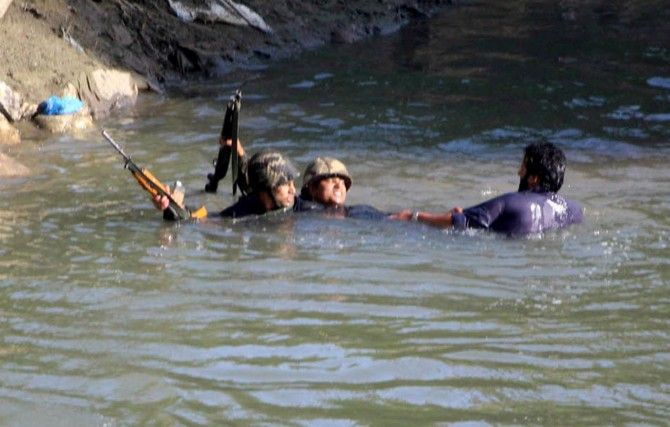
Did you achieve any success in toning down the anti-India rhetoric on these hostile Web sites?
We decided to combine an audio-video along with the text. We put together short clips of all the good work done by the army's Operation Sadbhavana like medical camps, schools etc.
The Kashmiris themselves told their own stories in these videos.
These stories were about how mosques were constructed, how the army helped rebuild homes and helped them in difficult situations.
In 6 months, the hostility of the people on the online sites reduced.
Can you give me some examples of the undercurrent of hostility that the army encountered in everyday life?
I'll give you two examples:
Seditious literature is printed by the separatists year after year.
In Lal Chowk there is a calendar sold every year where everyday is a martyr's day.
We asked the intelligence agencies to stop it because young people had access to it, visitors and tourists were seeing it.
After a lot of pressure, it was discovered that a printing press in Paharganj, Delhi, was printing it.
It was raided and there was a temporary lull, but there must be hundreds of other printing presses ready to do this.
We also found welcome tourist pamphlets circulated at railway stations, bus-taxi stands, the Dal lake and other tourist spots.
The first page had a welcome note in a soft language by (hardline Hurriyat leader) Syed Ali Shah Geelani to Dear Tourists.
The remaining pages were full of anti-India, anti-army rhetoric and the woeful story of subjugation by the Indian government and armed forces.
We realised it wasn't possible to retrieve all these pamphlets in circulation.
One person came out with a better idea, which was to print three times more pamphlets that would then be circulated.
In the pamphlet printed by us the first page was the same with Geelani's signature, but the remaining pages were not.
I told my people that our pamphlet would also reach Geelanisaab and he will say 'kisne kiya hai, pata karo (find out who did this)', and like we couldn't retrieve 10,000 pamphlets, he won't be able to collect 50,000.
Then someone came up with a better idea about distributing two CDs of popular Hindi songs shot in Kashmir along with the pamphlets.
These were given to taxi drivers and hotels.
In that CD after every 2 or 3 songs, there was a jingle with a social message.
These were momentary successes that somebody would overcome. So we continued to move to other innovative ideas.
We were spending a fair amount of time doing this.
It was coordinated at the highest levels and some very good strategies came out.
We had great success, but obviously we could not take it to town and thump our chests.
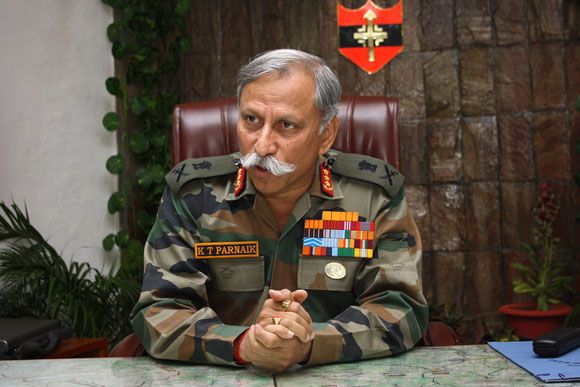
You gave the example of the Geelani anti-India, anti-army pamphlet. What is the solution to the separatists?
They have to be made irrelevant.
That cannot be done till they roam around free, get money from Pakistan and seek attention.
They were put under house arrest many times and not allowed to make seditious speeches from mosques.
They then started using mobiles that were put on a loudspeaker, so we installed jammers.
Individually, these may appear as very mundane activities, but when put into a jigsaw puzzle, they were part of a strategy to simultaneously cover 4, 5 issues:
- 1. Control the activities of the terrorists.
- 2. Control the activities of the separatists.
- 3. Prevent the radicalisation and instigation of the population.
- 4. Hold the hands of the administration... and yet we had to succeed.
What did your success come from?
The success came from the elimination of foreign terrorists within Kashmir.
There was not so much of noise and ramble at the funeral procession of foreign terrorists.
If a Hizbul Mujahideen terrorist was killed, the whole village would turn up and you also see that today.
But it showed that you were winning.
You took the police, CRPF, paramilitary with you, so they were also winning.
The biggest area of concern was the youth and how to appeal to them to stop arson and loot.
The ghettos in J&K are so located that it is very easy to participate in such activities.
What were some of the methods deployed to prevent the youth from participating in such activities?
Sports.
We came out with the Kashmir Premier League, which was a great success.
For four months, 370 teams played cricket.
Crowds gathered, but not at the mosques, but at the cricket fields.
We were worried that somebody could harm us because crowds used to gather, so we kept a discreet watch.
Those playgrounds became ideal places to bring sport celebrities and J&K ministers.
The face of this exercise was the J&K Sports Association, but the army was doing it.
It had a double advantage.
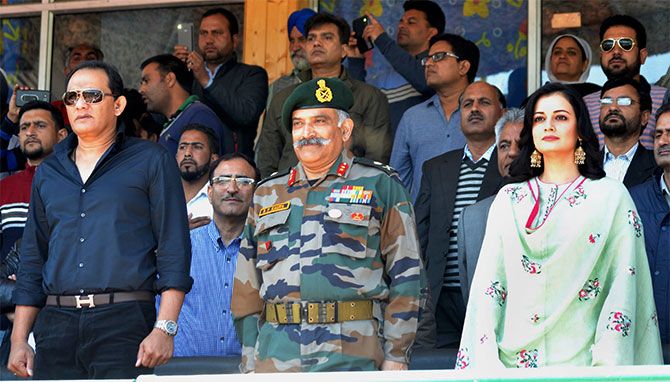
What difference did activities like the Kashmir Premier League make?
Stone pelting came down and a good tourist season returned.
Since the army's efforts prevented foreign terrorists from getting effective, they could not instigate, and hence violence also dropped.
The end result of this whole exercise was to bring a state of relative peace.
The administration, state and central governments need to have a Plan A, Plan B, Plan C -- ready to execute, the moment the situation starts improving.
But what would happen was that every time the situation relaxed, everybody relaxed.
The state government should have taken this platform to take off with initiatives, build infrastructure, elected members needed to travel to their constituencies.
All this has to be seen to be believed. But they are mostly only vocal.
I remember taking CDs of what we did in Kashmir to (Governor N N) Vohrasaab.
My lament was that the government must take over the initiative and the army could become an adjunct to what they were doing because we have been here and understand the place.
We have contacts and the presence to tell what is happening, but we cannot be permanently fixated because this is not our job.
We had created space for everyone. For the media, social activists, human rights groups. The government had also sent its interlocutors.
Yes, the three-member team of the late Dileep Padgoankar, Radha Kumar and M M Ansari.
They had no instructions to meet us. I met them in Jammu and told Dilip that I thought you would meet us.
He said you are part of the government, we are here to meet the stakeholders.
I said beg your pardon, we are the largest stakeholders here.
We then spoke for 3, 4 hours and created that inquisitiveness in them that we needed to meet more.
I told them to meet my corps commander when they visited Srinagar, to meet my divisional commander when they went to Kupwara and get an understanding of how we look at things.
The space that is created with the army's assistance -- when relative peace is established -- that is the time when the clock starts ticking for the administration and governance.
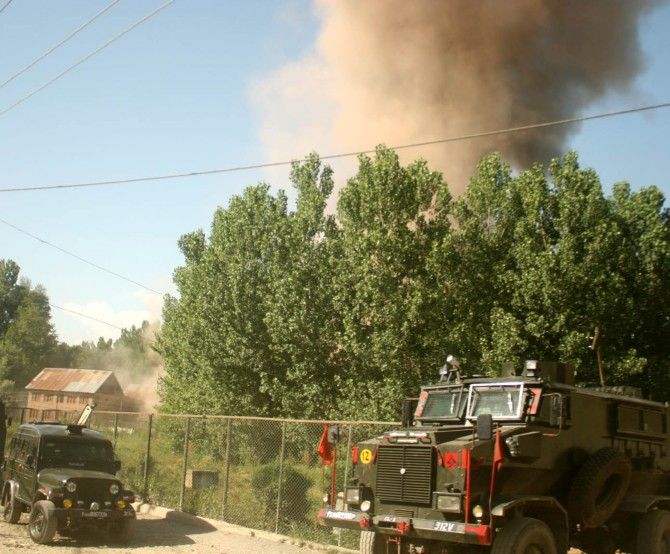
The Lashkar-e-Tayiba terrorists are killed.
Hours later, terrorists would ambush a group of Kashmiri policemen, disfiguring their faces after murdering them.
Photograph: Umar Ganie for Rediff.com
You mention some simple yet effective measures for managing perception. They must undoubtedly be very tedious to execute.
The army took some very good initiatives.
We had some very good people -- Ata Hasnain (commander of the XV Corps at that time and now a contributor to Rediff.com) in the valley, another general in Nagrota and many good officers who could think well.
In Op Sadhbhavana we started a system of youth empowerment and opportunities after graduation.
These happened on the sidelines of medical camps attended by large numbers.
The meshing up of these activities was so beautifully done that it came a circle.
Mind you, a lot of things I did I had no authority -- but we did it because we wanted to prove that while operating in an insurgency, terrorism affected area, there is a holistic way of arresting what was happening and turning it around.
We could turn it over, but we kept telling our people that mark my words, this is one summer, it may not be the same summer tomorrow.










